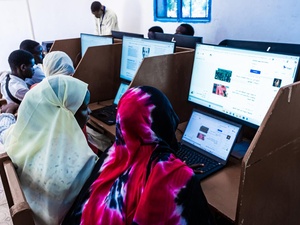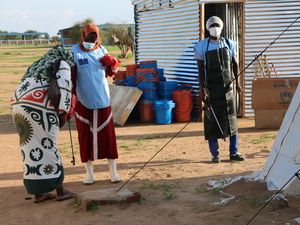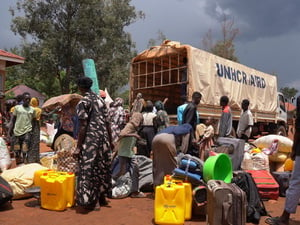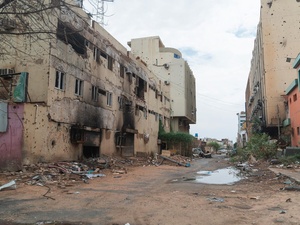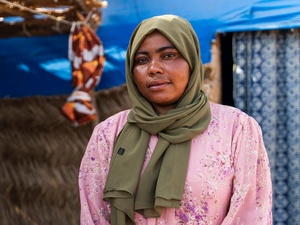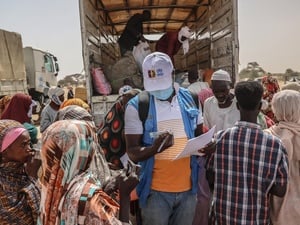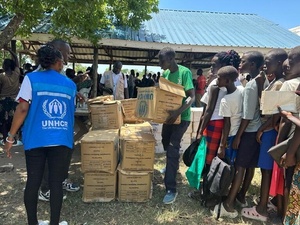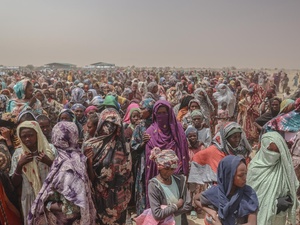Chad/Sudan: agencies working closely together to assist vulnerable refugees
Chad/Sudan: agencies working closely together to assist vulnerable refugees
Newly arrived Sudanese refugees in eastern Chad report that marauding militia groups are continuing to burn, loot and empty entire villages in the Darfur region of western Sudan in a conflict that has sent an estimated 95,000 people fleeing across the border since early last year. Hundreds of thousands of others are believed to be displaced inside Darfur.
A UNHCR emergency team in the north-east Chad region of Birak yesterday visited Djoran, one of many makeshift refugee sites along the insecure border between the two countries. There are an estimated 40,000 refugees now in the north-east border region.
Around Djoran itself, 15 km from the Sudanese border, there are between 4,000 and 8,000 refugees living in extremely precarious conditions. They have built hundreds of flimsy shelters made of branches and grass. The huts are usually no more than 2 or 3 square metres and often house entire families, averaging around five children each. The huts offer minimal protection from the sun and almost none from the cold night-time temperatures which can plunge to as low as 4ºC. The semi-arid Djoran area sits at an elevation of about 1,000 metres, so it can get quite cold and windy. Some recently arrived refugees have no shelter at all and sleep rough in the bush.
Most of the Djoran refugees arrived with little or nothing. UNHCR's border team staff say some have been in the area since July and were initially living on handouts from the local population, particularly those in the nearby village of Bali. Many of the Sudanese refugees and the local Chadian population are members of the same Djobal, Eranga or Zaghawa tribes. Medical assistance is being provided by MSF-Belgium.
A refugee elder who fled to Djoran in August said there are 20 to 30 new arrivals daily at his makeshift camp and reported there had been increasing attacks by Sudanese militia groups on villages across the border over the past 10 days.
UNHCR interviewed some of the recently arrived refugees, all of whom gave similar accounts of their flight: Militia men - known as the Janjaweed - attack villages, first shooting people caught in the streets. The attacks usually start early in the morning, around 6 a.m. The militia then raid village houses, stealing everything, including livestock.
A refugee from the Sudanese village of Garuma, 20 km from the border with Chad, said that a week ago, 150 militiamen arrived on horses and camels in the village. He fled with his pregnant wife and their five children to hide in the surrounding hills, where his wife gave birth one day after they fled. The militia then set a bush fire on the hill and he and his family escaped to another hill. He said the entire population of Garuma, about 2,000 people, fled the village and either moved to other nearby villages or crossed the border to Chad. The man, who fled to Chad on a donkey, said his wife and children are still hiding in the hills in Sudan because he wanted to check conditions in Djoran before bringing them across the border.
Another refugee, who arrived on the site on Wednesday, said she fled with her five children after the militia attacked Garuma and killed her father in his hut. She said the militia killed several men, sending others fleeing into nearby hills with their livestock. The woman said her own husband had left several weeks ago to seek work in another part of Sudan.
The refugee elder and others in Djoran also told of reports of rape and the abduction of women and girls by the militia groups. These reports cannot be confirmed as humanitarian agencies are not able to work in Darfur.
Humanitarian agencies in eastern Chad are working closely together to assist vulnerable refugees. UNHCR and UNICEF began the distribution of UNICEF-provided blankets on Wednesday in Djoran to pregnant women, children and old people. Thousands of Djoran refugees are also receiving food from WFP, as did others last week in Senette and Feguerra.
UNHCR is also distributing mats, jerry cans, kitchen sets and soap. MSF-Belgium operates a health centre in Birak and is planning to dispatch mobile teams to the Bali and Guimeze areas to vaccinate the refugees. Many of the refugees suffer from respiratory ailments, and a lot of children have conjunctivitis.
An estimated 95,000 Sudanese have fled to eastern Chad since early last year - 30,000 in December alone. They are now scattered along a 600-km stretch of remote borderland in dozens of makeshift camps that are still vulnerable to periodic raids by marauding militia groups from Sudan. UNHCR plans to begin an emergency relocation of tens of thousands of refugees away from the border starting next week. It will begin with a transfer to a new site at Farchana, east of the town of Abéché and about 55 km from the border. UNHCR and local Chadian authorities are also in the process of identifying more sites, which must be at least 50 km from the volatile border. Finding sites with enough water is a major problem. We hope to get as many refugees as possible relocated before the rainy season starts in mid-May, when sandy roads will be impassable for heavy trucks.


